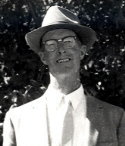
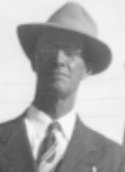 George Paskett, son of Philip Andrew Paskett and Emma Richins, born 29 December, 1893, at Basalt, Bingham County, Idaho. He was the eleventh child of the family of twelve children.
George Paskett, son of Philip Andrew Paskett and Emma Richins, born 29 December, 1893, at Basalt, Bingham County, Idaho. He was the eleventh child of the family of twelve children.
It was a very cold, hard winter, and the family was in destitute circumstances. It was during the depression when Grover Cleveland was president of the United States. The men could not get work that winter. The older children that were old enough went and picked up potatoes to help with the feeding of hungry mouths, they also received some flour for pay.
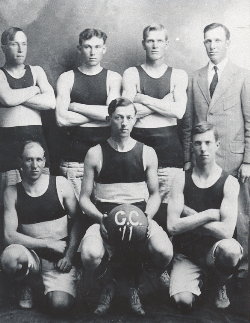
First Grouse Creek Basketball Team – 1911
Front Row: Alma Toyn, Oren Wilson, George Paskett
Back Row: Glen Jorgenson, William C. Kimber, Clarence Richins, Leman Jorgensen
The family lived in a two-room log house with only one bedstead. The seven older children slept on the floors on straw ticks, which had to be piled in the corner of the bedroom during the day. Fuel was very scarce and at times the family suffered with cold. George’s father took his team and with some other men they crossed the Snake River on the ice to the lava beds and brought back cedar wood to burn. When the wood was all burned, George’s oldest brother, Phil, would wrap his feet in gunny sacks every day and off to the railroad station he would go with his little homemade sleigh, and get a sack of coal that some men would roll off the open coal cars, while the engine was stopped, taking on water at the water tank.
When the potatoes were all eaten that the children had picked up, the family lived on bread alone for two weeks. They had one milk cow, but Sidney was only one year old and was bottle fed, so he had all the milk that the cow gave, until George came along, then he was deprived of that as George had to have the milk.
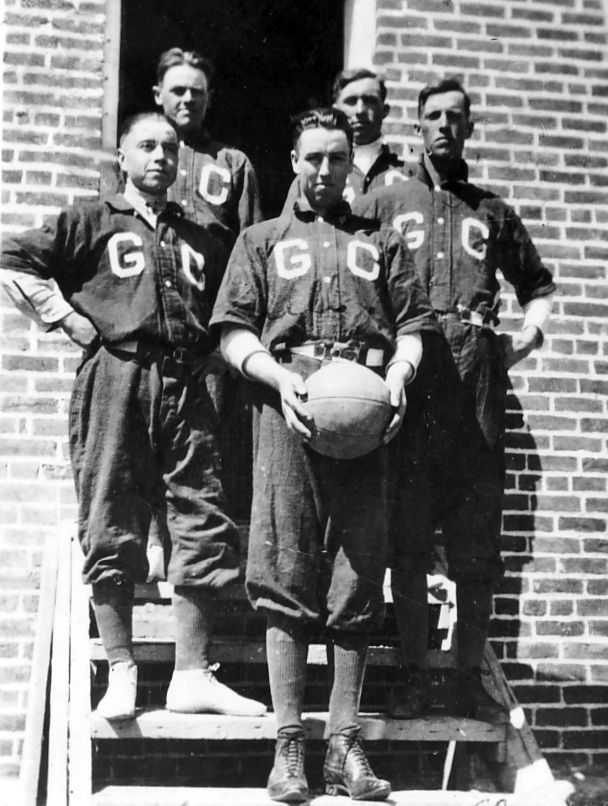
Afton Wakefield, Edwin Hadfield, Dell Warburton Winfred Kimber & George Paskett
Just before the baby was born, the family contracted diphtheria and five of the children came down with the disease. They had no doctor but a midwife, Christine Hubard, came to the home, delivered the baby boy, George, and took care of the other children with home remedies and what knowledge she had of medicine.
While the children were down with diphtheria, a little old man that lived alone, whom they called Charles, a good LDS member, would come to the home every two or three days to ask about the sick and would assist in the administering to them that were really sick, so through faith and prayer all were made well.
What humble circumstances to start life in, but it was a home where faith and prayer were ever present.
One night shortly after George was born, the last lamp chimney broke in several pieces, leaving the home in darkness for the rest of the night, except for what light came from the fire in the little stove.
In the spring of 1894 the family moved to a ranch west of Blackfoot, Idaho, called Riverside. There was no house on the place they rented, so they lived in a tent. They had a few chickens and had secured another cow, they planted a garden, used sage brush for fuel, now times were improved. During the summer, his father sat down on the damp ditch bank to rest and contracted rheumatism, which put him in bed, so they had to give up the ranch. It was then they decided to move back to Grouse Creek, Utah.
When they arrived in Grouse Creek they moved into a rock house belonging to Lorenzo Richins, until they could get logs from the canyon and build them a two-room house and move into it. They added a lean-to for a kitchen and cellar later on.
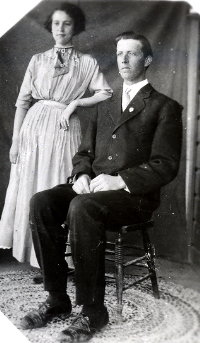
Amanda and George Paskett
At the time the family moved to Grouse Creek, Utah, George was almost a year old. His childhood days were spent at Grouse Creek where he attended elementary school. As his father was in very poor health and the older boys, Phil Jr., Frank, and Parley went away to work, that left Sidney and George, who were thirteen and fourteen years of age, respectively, to do most of the work on the farm, which made it so they could only attend school in the winter when the work was done on the farm.
George’s playmates were mostly relatives, such as cousins, of course, being boys, they loved to tease and play pranks on someone to annoy them, such as putting a tom cat by an open window then pulling its tail to make it yowl, or tick-tacking on a stove pipe so the string couldn’t be reached and cut loose, or maybe stringing a wire across the path to trip some young man who came home late after seeing his sweetheart (of course they were always nearby to get the laugh on him.)
George’s time was not all spent in play and foolishness, he was a hard worker, and when he started a task he wanted to do it well and complete it, not leave any task half done.
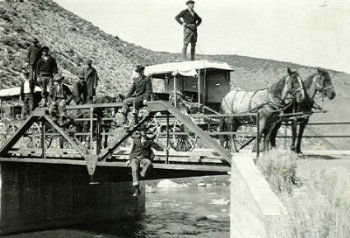
Grouse Creek Basketball – George Paskett, Herbert Tanner, Delbert Tanner, Roy (Frank) Frost, Arlin Wakefield, Afton (Jack) Wakefield, Ted Hadfield, Winfred Kimber, Delbert Warburton
In 1911 the school principal, Oren Wilson, organized a basketball team. George was a member of that team, and they went to different towns, competing with other teams. He enjoyed basketball, roller skating and many other sports, as dancing and horse racing and others. He was very fond of horses and liked to work with them, always took good care of his livestock. He was a good hand with horses and cows. George was always a very good farmer and he admired his crops and always worked hard to make his fields better. He had a sorrel team of mares that he was so proud of and thought so much of them that he refused to sell them for $400.00 at one time. He always enjoyed working with his livestock, in fact he was always very conscientious of all his work and every obligation that was his to perform.
On April 30, 1914, George took that one step toward exaltation. He married Amanda Tanner in the Salt Lake Temple for time and eternity. They had a very short courtship as both were quite young at the time.
When George started a home of his own he was not blessed with this world’s riches, but it was always a home filled with faith and trying to keep the commandments and to live uprightly and live true to the church.
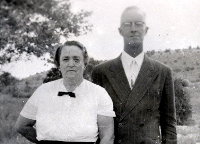
Amanda and George Paskett
When he was first married, they lived in one room of his father’s new house, but as their family started to come a new home was necessary so he built a sawed log house, with two rooms, down in the field close to his work and he, with his wife, a little daughter Rhea, and a baby boy, Robert, moved into a new home. It was a struggle to make a living but all were happy and tried to make the best of life, always attending to his church obligations.
George was always active in church and also community affairs. He was a ward teacher when very young, also a counselor in the MIA, Superintendent of the Sunday School, as well as an Assistant. He was Superintendent of the Mutual Improvement Association at one time. From January 21, 1945 to November 9, 1952 he was second counselor to Bishop Elmer Kimber.
In the autumn of 1920 George moved into a larger house that had belonged to his brother Frank, and the family lived there until the children married and went to homes of their own, but George and his wife still lived in the home and that was their home at the time of his death.
On September 8, 1921 their third and last baby was born, another girl, and they called her Afton.
George was always in favor of civic advancement and did very much to help bring electricity into the community and he really enjoyed the power when it was turned on in 1952. He also helped to lay a new water pipeline for household use and for use on lawns and small gardens to thirty homes.
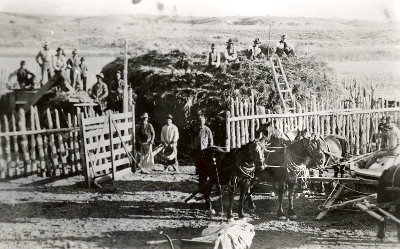
Thrashing Machine: George Paskett, Willington Richins, Newell Richins, Moroni Tanner, Uknown, Uknown, Orson Richins – Haystack: Unknown, Ralph Tanner, Valison Tanner Jr., Uknown, Sidney Paskett – Ground: Lorenzo Richins, Wilford Richins, Albert F. Richins and Phillip Paskett
For several years George and his brother Sidney contracted stacking hay in Nevada for the Utah Construction Company. They would take horses and men from home to help them. Sometimes they would have seventeen or eighteen men to work for them. Of course George took his wife along to do the cooking for them and the kids to help with it. They contracted and stacked hay at Rancho Grande, Nevada, San Jacinto, Nevada and at the Gamble Ranch near Montello, Nevada.
George was a good cook. He could make bread and cake just as good as most women could. Many times he has taken over the housekeeping, such as sweeping and mopping floors or anything there was to do and many times he took over the housekeeping in the absence of his wife or in the case of sickness. His children remember him for his “English flapjacks,” they resembled Yorkshire pudding only they were cooked in the fry pan and not in the oven. Rhea says, “They sure tasted good when Dad made them.”
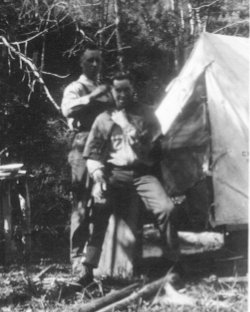
George Paskett & Raymond Kimber
At one time while his wife was away from home, George was keeping house, when several men who were working for the Bureau of Land Management came to stay at their home so George took them in, cooked breakfast for them, and put up lunches and they all went to work at 8:00 with the milking done and the dishes washed, then at night he would come in and prepare supper for the group. This lasted several days, there was six or seven of them all told. One of the B.L.M. men remarked that he would like this one item mentioned as he felt it was a great tribute to George to be so handy in the kitchen, as well as doing his work on the outside.
George was very good to his parents before they passed away, staying with them at night and caring for them whenever he could.
He was also very thoughtful of his mother-in-law after she was left alone and she only had to mention that she was out of wood and George was there with a good supply all cut and ready to burn.
George was a whiz at square dancing. He said it was the most restful kind of recreation he could find to do after a hard day’s work.
George had a calm, pleasing disposition and was very slow to anger, was as honest as anyone could be, was a good husband, father, neighbor and friend. He always taught his family to live their religion and to walk uprightly before the Lord and their fellow men.
George had arthritis in his hands and knees due to bad falls he had, when his team ran away with him, his saddle horse fell with him and he was dragged some distance with his foot caught in the stirrup, he fell from a load of hay when the team jumped over a ditch. His one hip was out of place. He had been a number of times to Dr. Floyd N. Barker and was getting so he could get around without pain and without limping, thanks to Dr. Barker and the faith and prayers of him and his family.
In March 1959, after working so hard all winter and having two accidents in a year, something happened that slowly sapped his strength and he started to be paralyzed on his left side, so he was taken to the doctor to find out what was his trouble. He was rushed to the hospital in Ogden, Utah on March 26, 1959 and within three days he had lost all use of his left side. He was kept in the hospital until April 14, 1959 when he was moved to Logan, Utah to the home of his daughter, Afton, where he was taken care of by his wife and family.
On April 30, 1959, their forty-fifth wedding anniversary, he made the statement that it had been a happy married life, and when their Golden Wedding came, they would go to Canadaand go through the temple there, as he was a devout believer in temple work, and had been many times. But it was not the will of the Lord to let him stay much longer on this earth.
On May 3, he was taken very ill and it was found he had a very sore throat, so the doctor gave him a shot to ease his suffering. He went to sleep and into a coma of which he never roused. On May 5, 1959, at 9:45 p.m. he quietly passed away in the Logan LDS hospital.
At his funeral on May 11, 1959 the ward chapel was so filled that people had to stand on the steps outside and a group that couldn’t even get on the steps stood out on the lawn. There was a large array of flowers and a grand tribute was paid to him. He was buried in the Grouse Creek cemetery beside his father and mother. He was survived by his wife, a son, Robert Paskett, two daughters, Rhea E. Toyn, and Afton Blanthorn, twelve grandchildren, one great-grandson, three brothers, Philip J. Paskett, Parley R. Paskett, Sidney Paskett, and four sisters, Annie Barlow, Rose Thompson, Polly Jeffs, Christine Richins, and many dear friends. The pallbearers were nephews of George – Mertin Paskett, Glen Paskett, William Shaw, Clifford Paskett, Francis Barlow and Arthur Paskett.
His philosophy of life was, “Do unto others as you would have them do unto you,” as was taught by the Savior.

